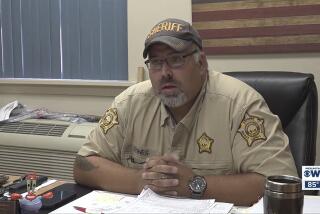In Cairo, a fleeting sense of serenity
It was a simple, yet unsettling, question.
“Is your passport American?”
“Yes.”
“They’ve lost it.”
“Can they find it?”
“God willing.”
The guard at the Saudi Embassy in Cairo said nothing else and wandered away. Behind thick glass, two men in the visa department -- one on his knees, the other hunched in a chair -- dumped out basket upon basket of passports that floated on the floor like a green sea around them. They were searching for a fleck of blue.
Passports were tossed and scattered, a life-size, briskly shaken snow globe with ominous consequences. The men grew exasperated. I grew nervous. The guy next to me, worrying that his own passport was buried amid the tumult, commiserated the way someone does who doesn’t speak your language. He winced, rolled his eyes and shrugged the universal sigh of resignation.
Then, suddenly, a hand shot up holding a little book imprinted with a golden eagle. Laden with staples, smeared with stickers, my passport was battered but intact. The man behind the glass smiled, but, being a bureaucrat, quickly caught himself and slipped back on his dour mask. He slid the passport across the counter, nodded his head for me and my documents to get lost.
It was another Cairo afternoon, hot, chaotic, uncertain. This city of 18 million grinds and lurches, nothing is ever easy, whether it’s getting a travel visa, hiring a plumber with the right tools or finding somebody, anybody, to respect the concept of waiting your turn in line. The standard answer to every question is “Inshallah,” or God willing, as if each act, no matter how small, requires divine intervention.
Passport secure, I stepped through the embassy gates and into the street. The cop in the white uniform wanted, but didn’t outright ask for, a tip for allowing my car to park undisturbed on a public street. He waved goodbye, and out on the Nile corniche, traffic was a thick, steely stew of fumes. The Egyptian beside me was complaining about the price of chicken and the quality of politicians.
Knots of people waited outside a public hospital. A woman in a tunic wept into her hands; a man with a cane barely got over the curb. An old man carrying a bag raced for an overcrowded bus. He missed it, stopped and stared as it rolled around potholes past a large, dusty picture of President Hosni Mubarak, which must have been taken years ago when he was robust, one of the portraits painted around the city that have frozen him in another time.
The pump at the gas station didn’t work, with every squeeze the nozzle clicked off and had to be squeezed again. The attendant, however, was adamant about using this particular pump. It took 11 minutes to fill the tank. It was 100 degrees. Sweat rivers ran. Cars raced the wrong way down a one-way street, but nobody noticed or cared; they searched for a brief crack of light to hurtle through. Drivers in Cairo don’t brake, they beep in petulant song.
A man tumbled off his moped, scraping his arms and cursing. People gathered, hoisted him up, sent him on his way. The kid who sells baskets on the corner pleaded for a bit of money to call his mother. She lives two hours away, but his father had told him it was time for him to become a man so he pulled him out of school and gave him a job. The boy hadn’t been home in weeks; he sleeps under the basket cart. He said he missed his mother and his new baby sister.
“Mister, just for a short call.”
And then it happened, like it does nearly every day, that moment of serenity. Where and when, you never know, but it comes. This one was of a boy riding a bicycle beneath flowered trees. Two dry-cleaned suits in billowing clear plastic bags were slung over his shoulder. He pedaled and hummed. He was headed, perhaps, for the home of an ambassador or a rich man. The suits looked as if they cost more than the boy would make in a year, maybe two, but he pedaled through the shade and glided joyously into the sunlight.
--
More to Read
Sign up for Essential California
The most important California stories and recommendations in your inbox every morning.
You may occasionally receive promotional content from the Los Angeles Times.










